
Normal adult equine body temperature runs higher than our human version of 98.6° Fahrenheit, although anything above 101.5° is considered a fever for horses. What do you do when your horse is running a temperature? Let's take a closer look, including possible causes and how you can help.
What causes a fever?
The medical term for fever is pyrexia (pyro from the Greek word for fire). A molecule that causes a fever is called a pyrogen.
Think of any warm-blooded animal's normal body temperature as a thermostat set by a part of the brain called the hypothalamus. A pyrogen changes this internal set-point within the brain and turns the dial up, resulting in a fever.
Pyrogens can come from both outside and inside the body. Some types of bacteria contain specific chemicals that will directly cause a fever. Other bacteria, viruses, and infectious organisms stimulate the body's immune system to produce pyrogens that travel through the bloodstream into the brain and tell the hypothalamus to turn up the heat.
Typically, a feverish horse will be lethargic and off-feed. He may have droopy ears and seclude himself from the herd or won't come to the fence or stall door for a treat. If severe enough, he may show signs of dehydration, such as an extended skin tent and/or dry and tacky gums.
Taking a horse's temperature
Ideally, you should train your horse to accept having his temperature taken before he gets sick. Temperatures should be taken rectally on horses; temporal thermometers designed for use on your forehead will not work through a horse's hair coat.
Digital thermometers are relatively inexpensive; price differences typically indicate the speed at which they give a reading, and are not a reflection of their accuracy.
Diese Geschichte stammt aus der January-February 2024-Ausgabe von Young Rider.
Starten Sie Ihre 7-tägige kostenlose Testversion von Magzter GOLD, um auf Tausende kuratierte Premium-Storys sowie über 8.000 Zeitschriften und Zeitungen zuzugreifen.
Bereits Abonnent ? Anmelden
Diese Geschichte stammt aus der January-February 2024-Ausgabe von Young Rider.
Starten Sie Ihre 7-tägige kostenlose Testversion von Magzter GOLD, um auf Tausende kuratierte Premium-Storys sowie über 8.000 Zeitschriften und Zeitungen zuzugreifen.
Bereits Abonnent? Anmelden
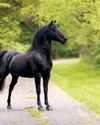
The MORGAN
The Morgan can do any equestrian sport while also having the personality of a family pet.

LEFT ALONE
Stacy Westfall's orphaned foal thrives by finding a friend.
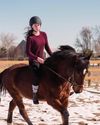
Wild Rose Trainers
Young trainers and Mustangs learn from each other in a unique program.
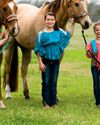
HAPPY CAMPERS
Now is the time to find the perfect horse camp for the summer.

Dressage Details
Achieve better harmony with your horse using dressage training.
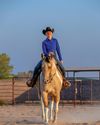
Side to Side
Position yourself for a perfect sidepass.
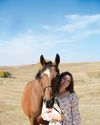
MY BUSINESS JOURNEY
Emma wanted to give her riding outfits a colorful touch, and ended up launching a successful belt business.
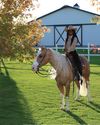
A Heart to Serve
Cavannah Hansen uses her talents and horses to help others in a variety of ways.
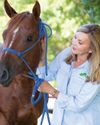
Animal Behaviorist
Are you interested in helping improve horse or pet interactions with their owners? This may be the career path for you.

SIX THINGS YOU DON'T KNOW ABOUT ME
Esme shares some secrets as to why this major YouTube star isn't so different from you and me.